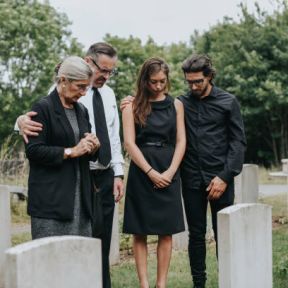Losing a Spouse, Parent, Child, or Sibling to Suicide
Losing any close other to suicide brings unimaginable pain. But the specific relationship of the lost loved one—whether they're a partner, a parent, a sibling, or a child—does play an integral role in how survivors can navigate their grief, come to terms with their life after the death, and find ways to cope in both the short- and long-term. What's more, few people can truly understand the loss of a spouse, parent, child, or sibling to suicide unless they’ve experienced it themselves; thus, turning to others who’ve undergone a similar loss is one of the most powerful tools at survivors’ disposal.
For immediate help in the U.S., 24/7: Call 988 or go to 988lifeline.org. Outside of the U.S., visit the International Resources page for suicide hotlines in your country. To find a therapist near you, see the Psychology Today Therapy Directory.
On This Page
Losing a spouse or long-term partner to suicide is devastating and unmooring. Trying to grapple with the sudden loss of intimacy and emotional connection that a partner provides is difficult enough—but because couples typically share finances, child-rearing duties, and other responsibilities that the surviving spouse must now juggle alone, it’s common to feel as if they can barely keep themselves or their family afloat. Spouses also often face immense guilt; though the death of their partner wasn’t their fault, many wonder how they could’ve missed signs of suicidality in the person closest to them.
It’s normal to feel as if the grief may never abate, and it’s true that it will likely always be a part of the surviving spouse’s reality. But most find that, with time, the pain does ease and they are able to function again. The help of family, friends, and often a therapist can be imperative, and there is never any shame in reaching out to others for emotional or practical support as the survivor works to make sense of the loss.
Suicide loss need not be shouldered alone. As with any form of grief, family and friends can be an enduring source of support, providing an emotional outlet and practical help with food preparation, childcare, and other day-to-day tasks that can feel near-impossible in the days and weeks after the death. While it may feel overwhelming to even ask for help, reaching out to the people closest to you is often gratifying, bolstering relationships and perhaps even easing the pain of the loss, if only slightly.
But friends and family, no matter how supportive, may not be able to fully relate to the loss and may not always know what to say. For this reason, support groups for those who have lost their spouse to suicide can be immensely valuable. Hearing how other spouses shouldered the burden of their spouse’s death and learned to live with their grief can help surviving spouses feel understood, and may provide a sort of roadmap for how the spouse can start to heal. Individual therapy, too, can be of great help; finding a therapist who specializes in grief or suicide loss may prove especially beneficial.
Children who lose a parent to suicide rely on the other adults in their life—particularly their surviving parent—to help them make sense of the loss. While it may be difficult for the surviving spouse to speak about the suicide, children cope best when they are told honest, age-appropriate information and allowed to express their grief openly.
Explain, first and foremost, that their parent loved them very much, but he or she struggled with terrible, long-lasting sadness (or another serious mental illness, or substance abuse, etc.) that led them to want to hurt themselves. Emphasize that while it’s not always possible to know why someone chooses to die by suicide, the child is unequivocally not to blame—since children tend to fill in gaps in knowledge with their own interpretations, it’s imperative to explain overtly that nothing they did or said caused their parent to take their own life.
In the weeks and months after the death, the surviving parent should make it known that it’s OK for the child to ask about their parent, or to share memories or photos; leaving the subject unspoken tells children that their grief is shameful or must be carried out in silence. Above all, children need to know that even though they have lost their parent, they will not be left alone. Offering stability and reassurance—with the help of other trusted family members, as needed—can help children come to terms with the loss and understand that their family is not broken.
Hearing about an ex’s suicide can trigger complicated emotions, regardless of whether the exes kept in touch or if contact had been sparse after the split. Hearing that someone who was once deeply loved was in such pain often leads, understandably, to feelings of grief. But because breakups are often tense or painful, and because closeness has likely faded with time (even if the exes remained amicable post-breakup), many people feel distant from their ex and feel strange for grieving them so strongly. If a new love interest is in the picture, someone may endeavor to hide their pain for fear of upsetting their partner.
But it’s OK—indeed, normal—to grieve an ex’s death in some way. Someone who was a valued partner for months, years, or even decades leaves a significant mark on a person’s life, even if the breakup happened far in the past. Sharing the grief with one’s current partner, if applicable, can feel fraught, but it’s important to emphasize that feeling pain from the loss doesn’t necessarily indicate anything negative about the new relationship. Turning to other family or friends can also be helpful, as can individual therapy.
Surviving spouses tend to blame themselves for their partner’s death and struggle with overwhelming feelings of guilt and shame. But countless people who die by suicide made a concerted effort to hide their intentions from loved ones—including and often especially their spouse. Suicidal thoughts are experienced by many as a great source of shame; someone may go to great lengths to “stay strong” for their partner, even as they wrestle with their own demons. And even partners who are aware of a partner’s mental illness and are supporting them through it can be completely blindsided by a suicide.
It’s tempting to believe that love can triumph over any problem, including serious mental illness or deep-seated despair. But the reality is that depression and other forms of mental illness are relentless adversaries, and partners alone can’t be responsible for saving their spouse’s life. Someone’s decision to kill themselves does not mean their partner failed them, and it doesn’t mean they loved their partner any less. Partners wrestling with self-blame should not hesitate to seek support as they come to terms with their spouse’s death and recognize that it was not their fault.
The death of a parent, at any age and of any cause, is often a significant source of grief. But losing a parent to suicide can be deeply traumatic—and if the death occurs in childhood, it may have long-term effects on the child’s emotional development. While many children who survive a parent’s suicide grow to be secure, mentally healthy adults, most report that their parent’s death left a wound that never fully healed. It may rear its head in their relationships, their own mental health, or how they relate to their own children. Addressing the lingering effects of the death in therapy—either as a child or as an adult—can help someone let go of self-blame and feelings of rejection.
There is no statute of limitations on grief, and even those who lost their parents to suicide decades earlier find that individual therapy can help them navigate the loss and move toward a more hopeful future. Many adults also find comfort in grief support groups for individuals who have lost their parents. While the best fit will be unique to the individual, some survivors report that groups specifically related to a parent’s suicide were the most helpful because they allowed them to forge closer connections with others who understood what they were going through.
Sharing the loss with trusted others can also be a great source of comfort. Openly talking about the lingering effects of the loss can help someone feel better understood by their loved ones, and sharing stories about their parent can help preserve their memory—including the moments of joy and love that may have felt especially difficult to access in the immediate, often traumatic aftermath of the death.
Research suggests that children whose parents died by suicide tend to display more psychological distress and are at heightened risk of depression and anxiety than other children, even children whose parents died of natural causes. Children who survive a parent’s suicide are also more likely to show behavioral problems—including declining academic performance, withdrawal, or outbursts. While these effects are not necessarily permanent, they can be long-lasting; sadly, such children have a heightened risk of suicidal behavior as adults, and may be more likely to struggle with mental health challenges or substance abuse even decades after the death.
On the other hand, many children—often with the help of trusted family, friends, and therapists—will be able to successfully manage their grief and grow into secure, mentally healthy adults. Even then, however, the scars of a parent’s suicide will likely never fade.
Children—especially young children—may not have the ability to understand the social and psychological factors that would lead someone to take their own life. Though children are sensitive to their parents’ distress—and tend to try to help whenever and however they can—they may not understand its causes or consequences; a parent’s depression, for example, may be interpreted as fatigue or mere irritability.
Because of this, children may be especially likely to blame themselves for the death. Many adults who lost a parent to suicide as a child recall that they felt immense guilt—if they had been kinder, less “annoying,” or more obedient, their younger self reasoned, their parent wouldn’t have done such a thing. Even older children and teenagers, who may be more cognitively equipped to understand why their parent chose to die by suicide, often struggle with deep feelings of rejection.
Surviving family members can help a child navigate their grief by providing space to talk about the death and express big, difficult emotions. Let them know in no uncertain terms that the death was not their fault. It’s OK to explain suicide, mental illness, or substance abuse in age-appropriate language; if such things are kept secret or perceived as taboo, children will often fill in the gaps with their own (often inaccurate) interpretations of what occurred and who is to blame.
Assure the child—through both words and actions—that they will always be taken care of, even though their parent is gone. Adults caring for a child who has survived a parent’s suicide should not hesitate to seek mental healthcare for them if possible; to find someone nearby, visit the Psychology Today Therapy Directory.
A parent’s suicide casts a long shadow, regardless of how old someone was when it occurred. Adults who lost their parents to suicide as children may feel like they’re supposed to be “over it,” or may wonder why their grief continues to rear its head in unexpected ways. Some report going to great lengths to put as much distance between themselves and the tragedy as possible—moving far away from home, for example, or making an effort to never think about or talk about the suicide. But they may find that this leaves them lonely, emotionally unfulfilled, and deeply confused. Some report that they struggle to get close to others because they are unwilling or unable to talk openly about the death.
Individuals who lost their parents to suicide as adults, on the other hand, may feel entirely blindsided by the death, which can magnify their grief. They may feel unable to relate to others who lose parents to other causes, and may feel angry or ashamed that their parent died by suicide and left them to fend for themselves. Young adults, who are still trying to make sense of their identity, may struggle to come to terms with what the death means for them or their future self; many worry that they're doomed to the same fate. And while some adults may hold lingering childhood views of their parents as unflappable or invincible—views which can be completely derailed by a parent’s suicide—even those who were fully aware of a parent’s struggles with mental illness, substance abuse, or a related risk factor may find it difficult to reconcile the death with their happy, loving memories of their parent.
The death of a child is every parent’s worst nightmare; the death of a child by suicide even more so. Most parents who lose a child in this manner feel like no one else will ever truly understand what they’re going through—and in a way, they’re right. A child’s suicide leaves a gaping hole in a parent’s heart, and the mix of horrible guilt, self-blame, despair, and anger often feels like too much to bear. Most surviving parents are tormented by obsessive thoughts about what they could’ve done differently; many struggle with suicidal thoughts of their own.
No parent will ever “get over” the death of their child by suicide, and they shouldn’t be expected to. But many do find that, with time, they discover a way to live with the loss and see meaning in life again. Seeking support—whether from loved ones, therapists, or support groups—and taking steps to honor their child’s memory can help parents make sense of their grief and regain a feeling of purpose.
Most parents who lose a child to suicide find that in the weeks and months after the death, they feel lost and worthless; some feel as if they’ll never experience happiness again. While these feelings are normal, it’s important not to isolate yourself as you shoulder this terrible burden. If family and friends offer to help, let them—and don’t be afraid to reach out whenever you need more support, whether emotional or practical. Ask a loved one to find a therapist or a support group in your area, if you’re not up to the task; seeking professional help, along with connecting others who will be better equipped to understand what you’re going through, can help you manage feelings of guilt, despair, and shame.
Prioritizing self-care after a child’s death may seem frivolous or like a waste of time. But many bereaved parents find that making an effort to take care of their physical health—by exercising, eating right, and sleeping when they’re able—does help them better bear the burden of their immense grief. Self-care is, of course, not enough to soothe someone’s pain. But making as much of an effort as possible to not let it fall by the wayside can help more than someone might suspect.
Above all, be patient with yourself and don’t try to set a time limit for your grief. You have suffered an unimaginable loss; there is no right or wrong way to deal with it.
Losing a child to suicide does not mean that someone failed or was a terrible parent. Most people who die by suicide grew up with loving, supportive parents who cared deeply for their children and did as much as they could to help them.
It’s common for parents who lose a child to suicide to be tortured by thoughts about what a “good parent” would have done differently. But the reality is that even some parents who see their child’s problems and seek to help as early as possible are faced with this tragedy. Mental illness, substance abuse, bullying, and other risk factors for suicide are, in many ways, out of a parent’s control, regardless of how much the parent blames themselves or feels responsible for the death.
There may never be a way to make sense of the death or understand why it happened. But self-blame can be toxic and even dangerous; thus, it's important to seek help when feelings of self-blame feel like they're too much to bear. Parents who are experiencing their own suicidal thoughts should get immediate support by calling a suicide hotline in their country.
Some people who survive their sibling’s suicide report that they feel like the “forgotten mourners.” The immense grief of their parents—who have, of course, lost a child—tends to take center stage, while siblings' grief receives less focus. Many sibling survivors report that they tried to “stay strong” for their parents, or spare them from further pain by projecting calm or put-togetherness. But because they outwardly appear composed, they may be perceived by others as being less affected by the loss.
But siblings of course grieve, and grieve deeply. Some sibling pairs consider the other to be their best friend—and when one dies by suicide, it leaves a hole that can’t be easily filled. Older siblings, who tend to feel protectively toward younger ones, may agonize over why they weren’t able to protect their younger sibling from their fate. Connecting with other sibling suicide survivors, and being open with others, including parents, about the deep pain caused by a sibling's death, can help survivors start to heal.
A sibling’s suicide has been described by some survivors as an “avalanche in life’s path.” The death is often traumatic and confusing, and like other survivors, siblings often feel a range of emotions—guilt, anger, and devastating sadness among them. Siblings who were close confidantes may experience an unending feeling of betrayal—why, they wonder, could their sibling tell them everything except this?
Many sibling suicide survivors feel as if their grief is ignored by others; others deliberately withdraw because they feel that no one could possibly understand their loss, which can harm their friendships or drive a wedge between them and other members of their family. Some small research studies have concluded that after a sibling’s suicide, a survivor may struggle to form fulfilling romantic relationships—often, researchers suspect, because their sibling’s death left them hopeless that a happy future was in the cards for them. Some survivors report deliberately engaging in risky behavior in an attempt to “get back” at their sibling for the agony they caused.
On the other hand, many sibling suicide survivors report that over time, they are able to experience a new sense of purpose and recognize that nothing they did or said caused their sibling to take their own life. Some find that navigating the loss of their sibling—and grappling with the seemingly insurmountable pain that likely contributed to their decision to take their life—granted them greater empathy toward others struggling with mental illness or despair.
Immediately after the suicide, it’s hard to imagine that things will ever feel OK again. But it is possible to cope with the loss of a sibling—even if the pain never truly goes away, most siblings find they reach a “new normal” where they’re able to go about their life while still feeling and honoring their grief.
As with any kind of suicide loss, individual therapy is often a great help to sibling suicide survivors, as are support groups focused specifically on sibling suicide. Reading books, especially memoirs, about suicide loss can help someone put their feelings into words and see the course their grief might take. Connecting with other survivors, whether in person or online, can help someone feel less alone, and may help them learn coping skills that they can apply to their own lives—from journaling to self-care to fighting mental health stigma in their community.
Some sibling suicide survivors dread being asked, “So, how many brothers and sisters do you have?” Including the lost sibling can unearth long-buried emotions or may lead to awkward follow-up questions, but leaving them out can feel disrespectful to their memory.
How someone answers this question is ultimately a personal decision, and there is no right or wrong answer. Many survivors tend to find that the answer that feels most appropriate to them develops over time. While there is no shame in feeling strong emotions whenever the question is asked, many survivors report that it tends to feel most triggering in the months and years just after the death. But with time, as grief starts to heal, many survivors find that they are able to answer it without visible upset or awkwardness.














